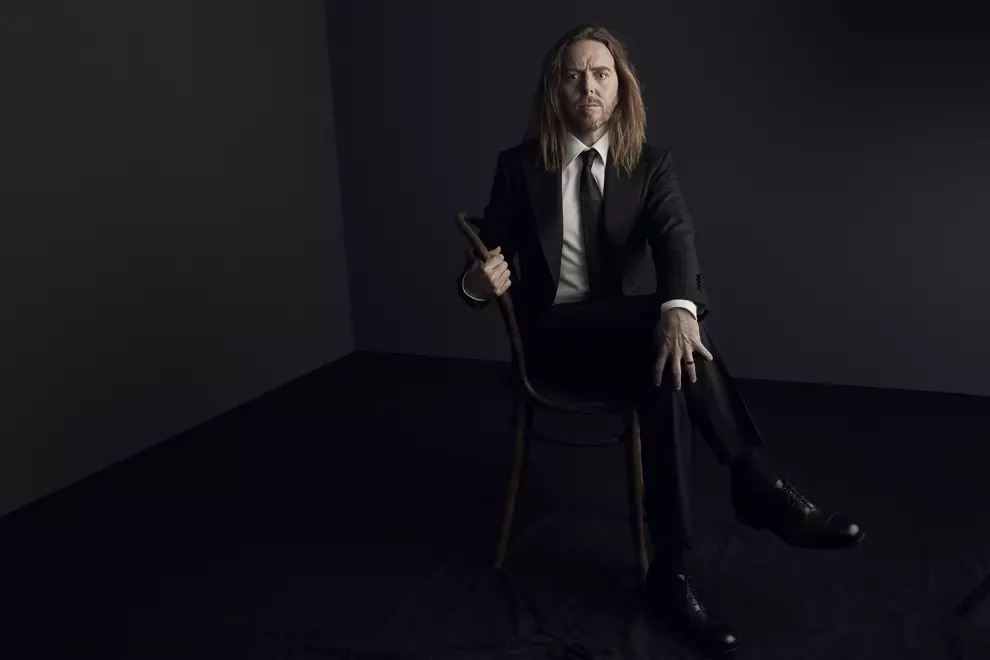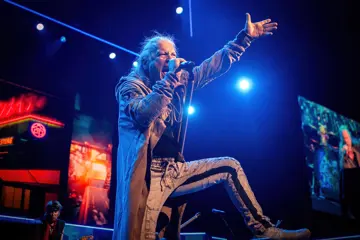 Tim Minchin
Tim MinchinFlattening the curve is a relatively new concept to many amid the current COVID-19 crisis, but it’s something Tim Minchin has been practising for the past few years with his career.
“It’s a pity it’s become famous for a virus,” the Perth-born artist says. “I’ve sort of flattened the curve with my career and that’s actually probably the thing that I’m proudest of.”
As Minchin notes, “there’s often an equal and opposite fall” when it comes to fame, and while public perception might be that he “got famous and then he disappeared because obviously, you know, he couldn’t cut it or something”, his shift out of the spotlight was a very calculated one.
“It’s hard to make yourself do because [fame] is addictive; being rich and famous is really bad for you – does anyone not know that?” he quips. “It’s terrible for your personality, it’s really bad for your family, it’s terrible for you, psychologically and for your mental health, and for your humbleness in the world.
“It distorts how you see the world and there’s nothing you can do about it. It’s no famous peoples' fault that they’re fuck-ups, it’s what happens to a human being when all their normal power relationships and social interactions are distorted.”
Don't miss a beat with our FREE daily newsletter
Funnily enough, in a move to curve his fame, he moved to LA, but his creative pursuits in the US saw him step aside from roles like the “drug-fucked and naked” Atticus Fetch in Californication that most Americans know him for and take on more behind-the-scenes work.
Minchin and family relocated to The Golden State after he signed a deal with DreamWorks to produce Larrikins, a $100m animated musical featuring Hugh Jackman, Margot Robbie, Naomi Watts and more, that was subsequently axed in 2017, four years into development.
“People in LA always go, ‘We want your talent! We want your vision!’ And then you go, ‘Here’s my vision.’ And they go, ‘Not like that.’ And you go, ‘Well, you asked me to come here – I didn’t ask you for a job. You asked me to come, you begged me to come, so I’m here and giving you my take,’” he tells.
“If you want to swim with sharks, you can’t be surprised if you get a nip on the arse."
“I was having those fights and that’s really interesting and I don’t mind all that. I’m not particularly defensive, I can be very passionate in my defence of something I believe is the right idea, but I’ve worked over the years on taking criticism, which everyone finds hard – certainly I did early on and I’ve gotten better at that.
“You’re battling big forces; you’re battling famously scary men, these people that you write about when you talk about these guys, these Weinstein types, but without the rapey-ness. Weinstein’s rapey-ness is just a part of his personality. There’s a lot of people who have all the rest of it in Hollywood who aren’t in jail but are still fucking weird bullies and stuff.
“If you want to swim with sharks, you can’t be surprised if you get a nip on the arse, but it just, in the end, if they take your work off you, you can’t fight – you can’t do anything. And I tried, I called meetings with the owners of Universal Pictures and I was like, ‘What have you done?’ They’re all sitting there going, ‘Why are you talking to us? You’re not meant to talk to us.’ And I’m like, ‘Because I’m Australian and I don’t care what your rules are.’”
That devastation was compounded by the fact Minchin’s musical adaptation of Groundhog Day closed early on Broadway, and in early 2018, he moved back to Sydney and began seriously focusing on his debut studio album while working on numerous other projects across screen and theatre.
The first taste of the forthcoming LP is quirky tongue-in-cheek single Leaving LA, which was accompanied by a stunning video from Tee Ken Ng.
Minchin’s first attempt at making an album dates back 20 years to when he recorded a collection of demos that he shopped around. His initial responses to those songs sent him towards comedy.
“Ever since then, I’ve just been waiting for there to be a spare six months so I can get back to writing non-comic songs,” he says.
“The weirdest thing about my career is that I’ve been writing songs since I was 12 years old and I’ve never made a studio album, but I finally got around to fixing it.
“With this album, I haven’t really thought about it much at all, I’ve just gone, ‘I’m gonna write what I wanna write.’ And what comes out tends to be, probably the thing I’m best at, which is treading the line between sentimentality and satire... You need to listen to every word, you’re not meant to let it wash over you. They are storytelling songs – they all tell a story.”
While fans will have to wait a little longer to hear the full album due to COVID-19, Minchin describes the overall collection of songs as “dense”, while laughing.
“I’m aware that’s why my music doesn’t get broad radio play and I’m never gonna be on the charts, but I think just making this record’s made me feel, for the first time in my life, really comfortable,” he reveals.
“I’ve always gone, ‘Aw, I suppose I’m sort of comedy and can’t really write pop songs.’ I’ve always not been quite sure what I am... I’ve always been worried about what my genre is and this record’s really helped me go, ‘Oh, this is my stuff and I don’t care where it gets played as long as I think it’s cool and I’m proud of the words and I don’t hate my voice too much.’ It’s been really great, actually. It took me a long, long time to feel like I was allowed to just make a studio record.”
“I’m a Grammy-nominated songwriter and I’m still not known as a songwriter, I’m known as a fucking comedian."
People will always try and define or label things, which isn’t really intuitive to creativity, especially Minchin’s eclectic style.
“I think that’s right,” he enthuses. “I think artists are sometimes helped by landing on a genre so they can go, ‘I’m part of that movement.’ I just never really listened to any particular music; I never really identified as a grunge kid or anything like that. That’s the trouble with piano, you don’t really land anywhere unless you’re going to be pop or jazz and then I went into cabaret.
“I’m a Grammy-nominated songwriter and I’m still not known as a songwriter, I’m known as a fucking comedian. Jesus, I’ve spent the last 20 years trying to be un-pigeonhole-able and then whinging when I don’t get the pigeonhole I want.
“It has gotten ridiculous – there’ll be a whole article written about my musicals and my TV show and then the headline writer will write, ‘Comedian Tim Minchin Looking For…’ And you’re like, ‘Well, hold on…’ But yeah, my mission is to keep putting out work that defies whatever the last attempted pigeonhole was, so it really suits me to have gone from comedy to musical theatre to straight acting and TV.”
His reason behind pivoting away from comedy to an extent and working across so many different formats, both in the spotlight and behind the scenes, was also to avoid the “sharp curve” often associated with comedy.
“The times changes and what people find funny changes and with a few notable exceptions, most comedians have a shelf life, because people go, ‘Right, we’ve seen that. We thought it was funny, we’re going to move onto the next thing we think is funny,’” he says.
“This record is saying, and even my concert, my last tour is saying, ‘Look, I’ll keep hopefully being entertaining and quirky and making you laugh, but my concerts aren’t meant to be stand-up shows. There might be a whole period where I’m not asking you to laugh at all.
“This album is, again, kind of about flattening the curve – that’s not why I did it, but it does sort of contribute to the flattening of the curve – but I am trying to make sure that, as I get older, and it gets a bit tiresome to hear me rhyming about sex and Jesus, to be like, ‘Yeah, but I’ve got other ways of expressing myself and other things to say.’”
Check out theGuide for all upcoming Tim Minchin tour dates.





















